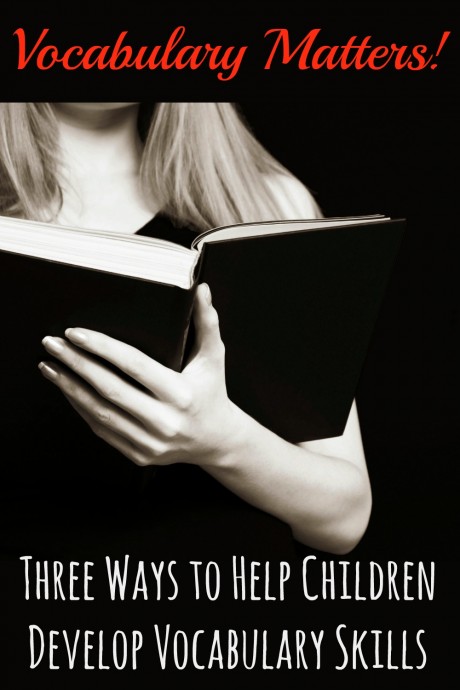
Have you ever came to a word while reading a book you’re totally engrossed in, but have the slightest idea the meaning of the word? If you haven’t, I have and so have my children. When this happens we often use context clues to help us figure out the meaning of the word or we grab a dictionary to help us if using the context isn’t working too well. Reading without understanding is not wise because it can easily make for misunderstanding the author’s intention of the text. It also can cause the reader to become frustrated due to the difficulty of the language. These are just a few reasons why vocabulary matters.
Wikipedia.org defines vocabulary as the set of words within a language that are familiar to that person. As a person develops so should their vocabulary. In order to help a child to develop an extensive vocabulary, it is important to expose them to different words through more than one medium.
Three Ways to Develop Vocabulary

- Exposure can happen through verbal communication. Do you often use the same words over and over again? If so, consider incorporating synonyms for the words you use most often when communicating with your child. For instance, instead of asking your child to show you how to use his new toy, you could ask him to demonstrate its use to you. This allows him to hear a new word in the midst of a familiar environment.
- Introduce new vocabulary through literature. I have learned quite a few new words through text. One of my favorite words that I learned from reading was chasm. I am sure I heard the word before, and I am also sure I allowed it slide right past me because I didn’t know the meaning. When I read the word, I was able to stop in the moment and define it. Now I know the meaning of chasm, and I always recognize it when someone uses it in conversation or a television show. When your child finds new words in literature, you can encourage her to create her own vocabulary dictionary. It doesn’t have to be fancy, cardstock and printer will do. This will encourage her to stop and define the words she doesn’t know in the text, and hopefully the next time she reads the word it’ll be part of her vocabulary.
- Foreign language can boost vocabulary. Learning a foreign language can be difficult if you have limited vocabulary in your native language, but learning a foreign language can also help you expand your vocabulary because learning it will force your child to be a diligent listener and student. Immersion programs such as Foreign Languages for Kids help build listening comprehension and vocabulary. If your child has a limited English vocabulary, but learns new words in Spanish he would soon know those new words in both English and Spanish therefore increasing his vocabulary. Not only will his vocabulary increase in those two languages, but he will also have a broader range of root words which often comes in handy when learning more difficult words.
Vocabulary is cited as one of the most common reasons for high achievements on standardized tests. It is also a skill that is constantly developing throughout life. No wonder vocabulary matters.
How are you developing your child’s vocabulary today?
Latonya Moore blogs regularly at Joy in the Ordinary where she writes encouraging posts for home educators and anyone else who needs a boost.
